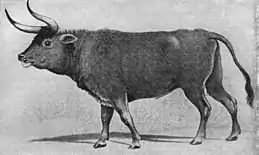туръ
Old East Slavic
Etymology
From Proto-Slavic *tȗrъ. Cognates include Old Church Slavonic тоуръ (turŭ) and Old Polish tur.
Pronunciation
Noun
туръ (turŭ) m (related adjective туровъ)
Declension
Declension of туръ (hard o-stem)
Descendants
References
- Sreznevsky, Izmail I. (1912), “тꙋръ”, in Матеріалы для Словаря древне-русскаго языка по письменнымъ памятникамъ [Materials for the Dictionary of the Old East Slavic Language Based on Written Monuments] (in Russian), volume 3 (Р – Ꙗ и дополненія), Saint Petersburg: Department of Russian Language and Literature of the Imperial Academy of Sciences, column 1037
- Nikolaev, Sergei L. (2020) «Слово о полку Игореве»: реконструкция стихотворного текста [“The Tale of Igor’s Campaign”: reconstruction of a poetic text] (in Russian), Moscow; Saint-Petersburg: Nestor-History, →ISBN, page 306
Old Ruthenian

туръ
Etymology
Inherited from Old East Slavic тоуръ (turŭ), from Proto-Slavic *tȗrъ, from Proto-Balto-Slavic *taurás, from Proto-Indo-European *táwros. Cognate with Russian тур (tur), Old Church Slavonic тоуръ (turŭ).
Further reading
- Bulyka, A. M., editor (2014), “туръ”, in Гістарычны слоўнік беларускай мовы [Historical Dictionary of the Belarusian Language] (in Belarusian), issue 34 (тресолнечный – умопомятенье), Minsk: Belaruskaia navuka, →ISBN, page 78
- Hrynchyshyn, D. H., editor (1978), “*туръ”, in Словник староукраїнської мови XIV–XV ст. [Dictionary of the Old Ukrainian Language of the 14ᵗʰ – 15ᵗʰ cc.] (in Ukrainian), volume 2 (Н – Ѳ), Kyiv: Naukova Dumka, page 451
This article is issued from Wiktionary. The text is licensed under Creative Commons - Attribution - Sharealike. Additional terms may apply for the media files.